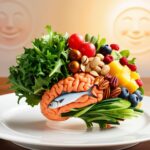How to transition to a healthier diet without stress
How to Transition to a Healthier Diet Without Stress: Switching to a healthier diet can seem challenging, but with the right approach, it doesn’t have to be stressful. The key to a smooth transition is making gradual changes that are easy to maintain. This article offers practical tips for adopting healthier eating habits in a way that minimizes stress and helps you stay consistent.
1. Start Small with Gradual Changes
Trying to overhaul your entire diet overnight can be overwhelming. Instead, start with small, manageable changes. For example, swap sugary drinks for water or add one extra serving of vegetables to your meals each day. These small adjustments can add up over time, making it easier to transition to a healthier diet.
SEO Tip: Use keywords like “small changes for a healthy diet,” “gradual diet transition,” and “start eating healthier.”
2. Focus on Adding, Not Restricting
Rather than focusing on what you can’t eat, think about what you can add to your diet. Incorporating more nutritious foods, like fruits, vegetables, whole grains, and lean proteins, can naturally crowd out less healthy options. This positive approach makes it easier to adapt to a healthier diet without feeling deprived.
SEO Tip: Target phrases such as “add healthy foods to your diet,” “focus on nutritious additions,” and “include more fruits and vegetables.”
3. Plan Your Meals Ahead
Meal planning can help reduce the stress of deciding what to eat each day. Set aside time once a week to plan your meals and create a grocery list. When you have nutritious ingredients on hand, it’s easier to make healthy choices. Planning also helps you avoid last-minute takeout or unhealthy options.
SEO Tip: Include terms like “meal planning tips,” “healthy meal prep ideas,” and “easy meal planning for beginners.”
4. Make Healthy Swaps
Start by making simple swaps that don’t feel like a drastic change. Replace white bread with whole-grain bread, use olive oil instead of butter, or choose baked options over fried foods. These small adjustments help you transition to a healthier diet while still enjoying your favorite meals.
SEO Tip: Use keywords such as “healthy food swaps,” “better alternatives for a healthy diet,” and “simple changes for better nutrition.”
5. Don’t Skip Your Favorite Foods
Eliminating your favorite foods entirely can make you feel restricted, leading to cravings or even binge eating. Instead of cutting out treats, enjoy them in moderation. For example, have a small piece of dark chocolate instead of a candy bar or choose a fruit-based dessert. This approach allows you to maintain a balanced diet while satisfying your cravings.
SEO Tip: Target phrases like “enjoy treats in moderation,” “balanced diet without giving up favorites,” and “healthy eating without deprivation.”
6. Stay Hydrated
Proper hydration is an essential part of a healthy diet. Drinking enough water can help reduce cravings, improve digestion, and keep your energy levels stable. Start your day with a glass of water and carry a water bottle with you to encourage regular hydration. Adding slices of lemon, cucumber, or berries can make water more appealing.
SEO Tip: Use terms like “hydration tips for a healthy lifestyle,” “importance of water for health,” and “stay hydrated naturally.”
7. Incorporate More Plant-Based Foods
Adding more plant-based foods like fruits, vegetables, nuts, seeds, and legumes to your diet can improve your overall nutrition. These foods are rich in vitamins, minerals, and fiber, which are important for maintaining good health. You don’t have to go fully vegetarian or vegan, but increasing your intake of plant-based foods can make a big difference.
SEO Tip: Include keywords such as “plant-based diet benefits,” “adding more vegetables to your meals,” and “plant-based foods for health.”
8. Learn to Read Nutrition Labels
Understanding what’s in the food you eat can help you make healthier choices. When shopping, take a moment to read the nutrition labels. Look for products that are low in added sugars, sodium, and unhealthy fats, while being high in fiber, vitamins, and minerals. This knowledge helps you select better options for your health.
SEO Tip: Target phrases like “how to read nutrition labels,” “understand food packaging,” and “choosing healthy products.”
9. Make Cooking at Home a Habit
Cooking at home gives you more control over the ingredients in your meals. Experiment with new recipes, involve your family in cooking, and try different cooking methods like grilling or steaming instead of frying. Not only will this help you eat healthier, but it will also save you money compared to eating out.
SEO Tip: Use terms like “benefits of cooking at home,” “healthy homemade meal ideas,” and “easy home-cooked recipes.”
10. Be Patient with Yourself
Changing your eating habits takes time, and there will be days when you slip up. It’s important to be patient and avoid being too hard on yourself. Focus on your progress, celebrate small wins, and remember that consistency is more important than perfection. A healthier diet is a long-term commitment, not a quick fix.
SEO Tip: Include keywords like “healthy lifestyle mindset,” “progress over perfection,” and “stay motivated on a health journey.”
11. Find a Support System
Having a support system can make transitioning to a healthier diet easier. Share your goals with friends or family members who can encourage you. You might even consider joining a group or online community where you can share tips and get advice from others who are also working on improving their diet.
SEO Tip: Target phrases such as “find support for healthy eating,” “join a health-focused community,” and “share your health journey.”
12. Track Your Progress
Keeping track of what you eat and how you feel can help you stay on course. Use a journal or a mobile app to log your meals and note any changes in your energy levels, mood, or overall health. This self-monitoring can be motivating and help you identify areas where you can improve.
SEO Tip: Use terms like “food tracking for health,” “monitor your diet,” and “track your eating habits.”
Conclusion
Transitioning to a healthier diet doesn’t have to be stressful. By making small, gradual changes, focusing on adding nutritious foods, and staying patient, you can develop healthier eating habits that last. The goal is not to achieve perfection but to create a balanced, sustainable approach to eating well. With these practical tips, you can enjoy the benefits of a healthier diet without feeling overwhelmed.
See More


